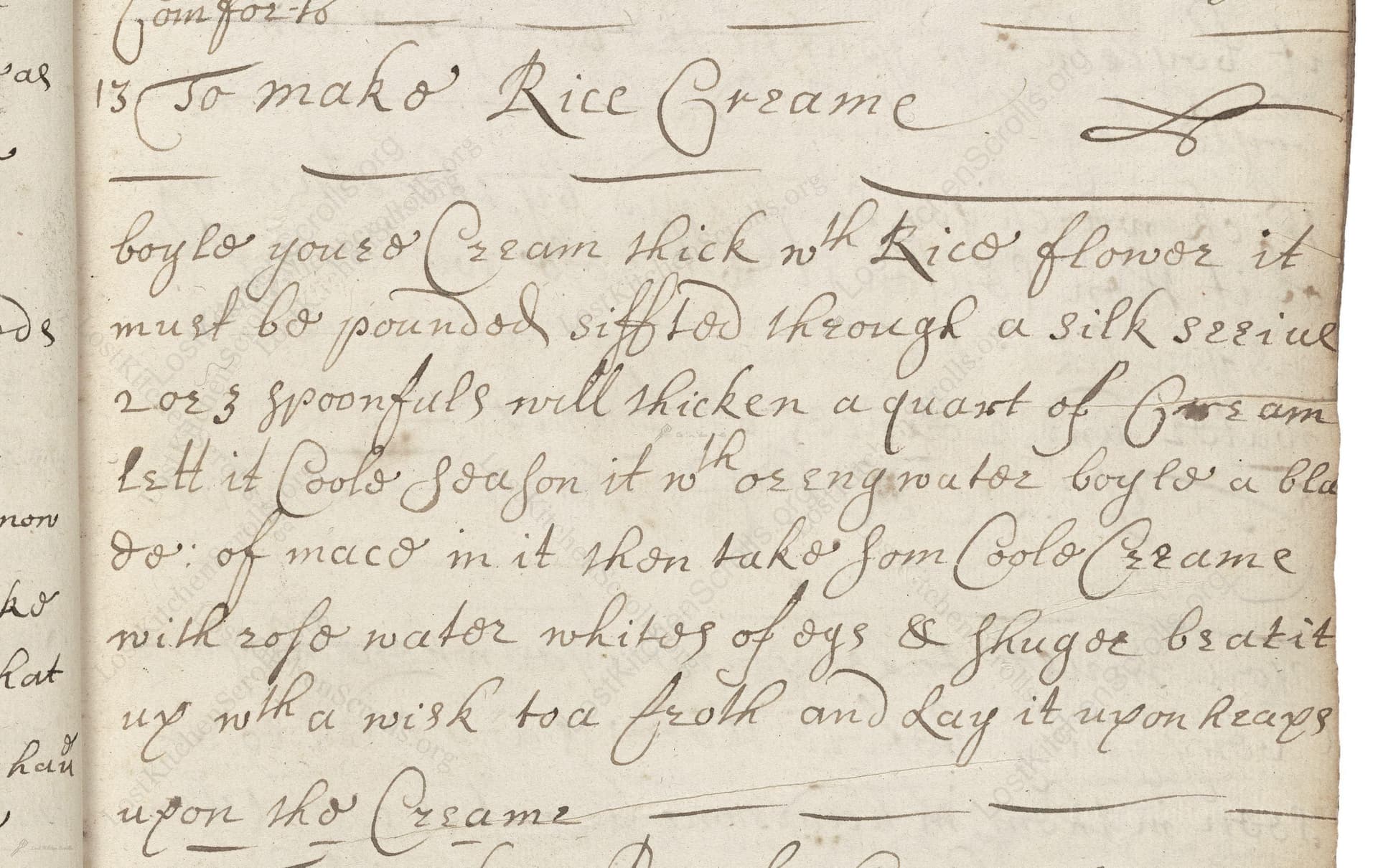To Make Rice Creame
From the treasured pages of Cookbook of Elizabeth Fowler
Written by Elizabeth Fowler

To Make Rice Creame
"boyle youre Cream thick wth Rice flower it must be pounded sifted through a silk seeive 2 or 3 spoonfuls will thicken a quart of Cream lett it Coole season it wth rose water boyle a blade of mace in it then take som Cole Creame with rose water whites of egs & shugor beat it up wth a wisk to a froth and Lay it upon heapes upon the Creame"
Note on the Original Text
Early modern recipes were brief, assuming knowledge of basic methods and rarely specifying quantities or cooking times. Spelling was idiosyncratic ('boyle' for 'boil', 'shugor' for 'sugar', 'wth' for 'with', 'Cole' for 'cold'), and punctuation was sparse. Precision was not a priority, as cooks tailored recipes to the size of their household and the availability of ingredients. Instructions like 'boyle youre Cream thick wth Rice flower' expected the reader to intuit both proportions and the desired texture from experience.

Title
Cookbook of Elizabeth Fowler (1684)
You can also click the book image above to peruse the original tome
Writer
Elizabeth Fowler
Era
1684
Publisher
Unknown
Background
A charming window into the kitchens of 17th-century England, this cookbook authored by the accomplished Elizabeth Fowler invites you to explore a delectable world of historic recipes, tempting sweets, and elegant table fare fit for any refined palate.
Kindly made available by
Folger Shakespeare Library
This recipe comes from the English manuscript recipe collection of Elizabeth Fowler, dated 1684. At this time, English upper-class kitchens delighted in luxurious creams, custards, and florally flavored sweets. Rice flour was favored both as a thickening agent and as an elegant, imported ingredient. Rose water was a prized flavoring in the Stuart and Restoration periods, often signaling sophistication and continental influence. Recipes like these were written by and for women of the gentry, compiling household knowledge for both hospitality and display.

The original cook would have used an open hearth or range, heating pans directly over coals. A sturdy, high-sided pan (often copper or pewter) served for boiling the cream, and a fine silk sieve (or 'tamis') would be used to ensure the rice flour was powder-fine. A metal or wood whisk, or even a bundle of twigs, would be employed to vigorously whip the egg whites into a froth. A shallow bowl or glass dish displayed the finished dessert, with decorative heaps of froth on top.
Prep Time
10 mins
Cook Time
15 mins
Servings
6
We've done our best to adapt this historical recipe for modern kitchens, but some details may still need refinement. We warmly welcome feedback from fellow cooks and culinary historians — your insights support the entire community!
Ingredients
- 4 cups heavy cream (35% fat or higher)
- 0.9 ounces (about 3 tablespoons) rice flour, finely ground and sifted
- 1 small blade of mace (or 1/8 teaspoon ground mace as substitute)
- 1–2 teaspoons (about 1/6–1/3 fluid ounce) rose water
- 2–3 egg whites
- 0.9–1.4 ounces (2–3 tablespoons) sugar
- Extra rose water, to taste
Instructions
- Begin by gently heating 4 cups of heavy cream (at least 35% fat) in a saucepan.
- While it warms, mix 3 tablespoons (about 0.9 ounces) of rice flour, which has been finely ground and sifted, into the cream.
- Stir constantly over low to medium heat until the mixture thickens, much like making a custard.
- Add a small blade of mace to infuse its delicate flavor as the cream cooks.
- Remove from heat, and strain out the mace.
- Once the mixture has cooled, stir in 1–2 teaspoons (about 1/6–1/3 fluid ounce) of rose water to scent the cream seductively.
- Meanwhile, whisk 2–3 egg whites with 2–3 tablespoons (0.9–1.4 ounces) of sugar and a dash of rose water, beating vigorously until soft peaks form and a froth develops.
- Using a spoon, heap clouds of this meringue-like froth on top of the cooled, perfumed rice cream before serving.
Estimated Calories
400 per serving
Cooking Estimates
You will spend about 10 minutes preparing the ingredients, and then 15 minutes cooking the cream mixture. Each serving has about 400 calories, and this recipe makes 6 servings.
As noted above, we have made our best effort to translate and adapt this historical recipe for modern kitchens, taking into account ingredients nowadays, cooking techniques, measurements, and so on. However, historical recipes often contain assumptions that require interpretation.
We'd love for anyone to help improve these adaptations. Community contributions are highly welcome. If you have suggestions, corrections, or cooking tips based on your experience with this recipe, please share them below.
Join the Discussion
Rate This Recipe
Dietary Preference
Culinary Technique
Occasions

Den Bockfisch In Einer Fleisch Suppen Zu Kochen
This recipe hails from a German manuscript cookbook compiled in 1696, a time whe...

Die Grieß Nudlen Zumachen
This recipe comes from a rather mysterious manuscript cookbook, penned anonymous...

Ein Boudain
This recipe comes from an anonymous German-language manuscript cookbook from 169...

Ein Gesaltzen Citroni
This recipe, dating from 1696, comes from an extensive anonymous German cookbook...
Browse our complete collection of time-honored recipes



